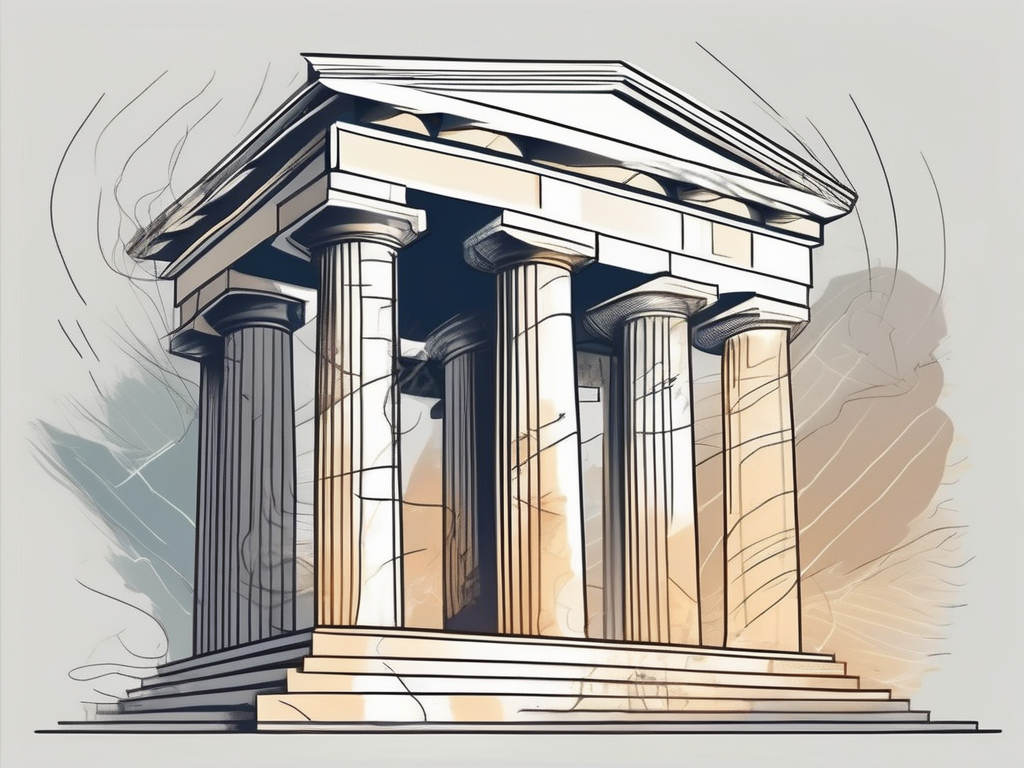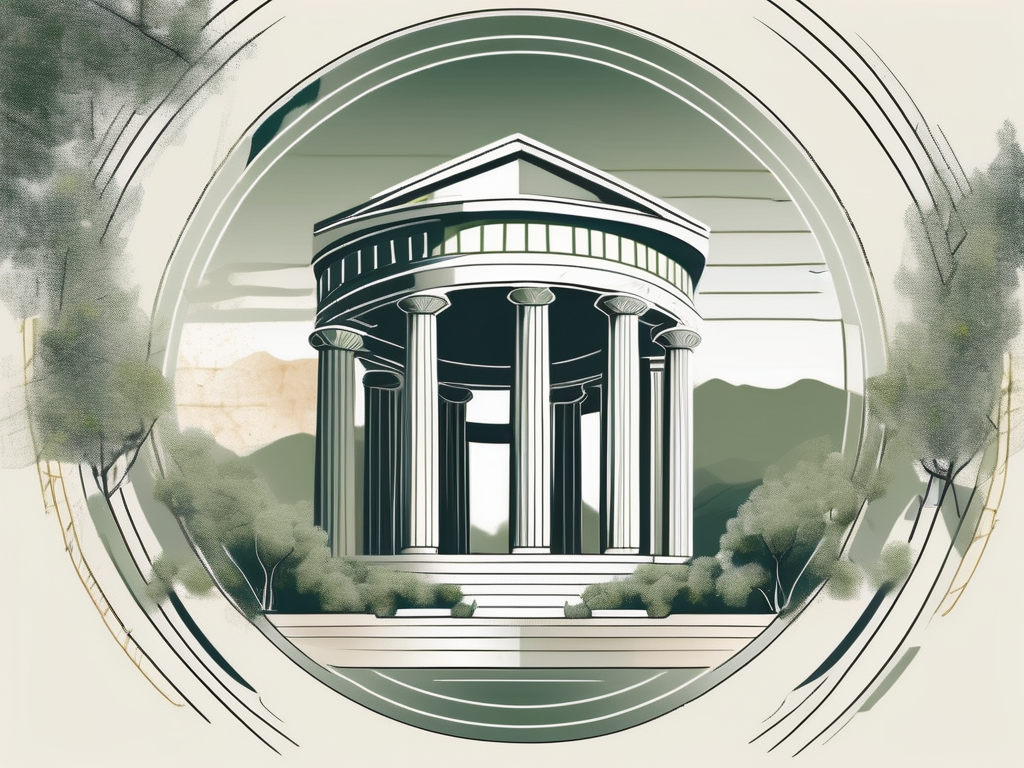Stoicism is not just a philosophical school of thought; it is a way of life, a daily practice that can help us cultivate inner strength and resilience. Understanding the origins and principles of Stoicism is the first step towards incorporating this ancient philosophy into our modern lives.
Understanding Stoicism: Origins and Principles
The philosophical roots of Stoicism can be traced back to ancient Greece, where its main proponents, including Zeno of Citium and Epictetus, taught that the path to happiness lies in accepting the things we cannot control and focusing on cultivating virtue. Stoicism teaches us that true happiness does not depend on external circumstances, but rather on our own thoughts and actions.
The Philosophical Roots of Stoicism
Stoicism emerged alongside other philosophical schools, such as Epicureanism and Skepticism, during a time of great change and uncertainty in ancient Greece. The Stoics sought to provide a practical philosophy that could help individuals navigate the challenges of life with equanimity and inner strength.
Ancient Greece was a melting pot of ideas and philosophies, with thinkers from various backgrounds exploring different ways to find meaning and purpose in life. It was in this intellectual landscape that Stoicism took root, offering a unique perspective on how to live a good life.
Zeno of Citium, the founder of Stoicism, was deeply influenced by the teachings of Socrates and the Cynics. He believed that true happiness could be achieved by living in accordance with nature and reason. Zeno’s ideas resonated with many, and Stoicism quickly gained popularity among the intellectual elite of the time.
Epictetus, another prominent Stoic philosopher, further developed the teachings of Stoicism. Born a slave, Epictetus experienced great adversity in his life. However, he found solace and strength in the Stoic philosophy, which emphasized the power of the mind to overcome external circumstances.
Key Tenets of Stoic Philosophy
Central to Stoic philosophy is the belief in the dichotomy of control. Stoics believe that there are things within our control, such as our thoughts, actions, and attitudes, and things outside our control, such as external events and other people’s opinions. By focusing on what is within our control, we can cultivate a sense of inner tranquility and resilience.
Stoicism teaches us to embrace the concept of “amor fati,” which means to love and accept our fate. This doesn’t mean resigning ourselves to a passive existence, but rather acknowledging that we cannot control everything that happens to us. By accepting our fate and focusing on what we can control, we can find peace and contentment in any situation.
Another key principle of Stoic philosophy is the practice of negative visualization. Stoics believe that by imagining the worst-case scenarios, we can prepare ourselves mentally and emotionally for any adversity that may come our way. This practice helps us develop resilience and gratitude for the present moment.
Stoicism also emphasizes the importance of living in accordance with nature. Stoics believe that everything in the universe is interconnected, and by aligning our actions with the natural order of things, we can find harmony and fulfillment. This involves living virtuously and treating others with kindness and compassion.
Now that we understand the origins and principles of Stoicism, let’s explore how Stoicism intersects with the concept of inner strength.
The Intersection of Stoicism and Inner Strength
Stoicism’s role in building resilience is evident in its emphasis on accepting and adapting to challenges and setbacks. By adopting a Stoic mindset, we can develop emotional fortitude and find strength in the face of adversity.
Stoicism’s Role in Building Resilience
Stoicism teaches us to view obstacles as opportunities for growth and development. Instead of being overwhelmed by difficulties, Stoicism encourages us to embrace them as valuable lessons and opportunities to cultivate our character. This shift in perspective enables us to navigate challenging circumstances with greater resilience and grace.
For example, imagine a person who has recently lost their job. Instead of succumbing to despair and self-pity, a Stoic individual would approach this setback as a chance to reassess their career goals and explore new possibilities. They would recognize that this moment of adversity presents an opportunity for personal growth, resilience, and the development of new skills. By embracing the challenge, they can emerge stronger and more resilient than before.
Furthermore, Stoicism teaches us to focus on what is within our control rather than fixating on external circumstances. This philosophy encourages us to direct our energy towards our own thoughts, attitudes, and actions, rather than being consumed by things beyond our control. By accepting the limits of our control and focusing on our own choices, we can build resilience and inner strength.
Emotional Fortitude and Stoic Philosophy
One of the key benefits of practicing Stoicism is the cultivation of emotional fortitude. Stoics believe that negative emotions are often the result of our own distorted perceptions and judgments. By becoming aware of our thoughts and choosing to reframe them in a more rational and constructive way, we can develop greater emotional resilience and inner strength.
For instance, let’s consider a situation where someone receives criticism for their work. Instead of immediately reacting with defensiveness or anger, a Stoic individual would take a step back and objectively evaluate the feedback. They would recognize that criticism is an opportunity for growth and self-improvement. By reframing the situation and viewing it as constructive feedback rather than a personal attack, they can maintain their emotional equilibrium and use the criticism as a catalyst for improvement.
Stoicism also emphasizes the importance of practicing gratitude and maintaining perspective. By regularly reflecting on the things we have to be grateful for, we can shift our focus away from negative emotions and cultivate a more positive and resilient mindset. Stoics remind us that even in the face of adversity, there are always things to be grateful for, such as our health, relationships, and personal accomplishments.
Now that we understand the role Stoicism plays in building inner strength, let’s explore how we can incorporate Stoic principles into our daily lives.
One practical way to incorporate Stoic principles into our daily lives is through the practice of negative visualization. This involves intentionally imagining worst-case scenarios and reflecting on how we would respond to them. By mentally preparing ourselves for potential challenges and setbacks, we can build resilience and develop the ability to adapt and thrive in difficult circumstances.
Another Stoic practice that can help cultivate inner strength is the discipline of voluntary discomfort. This involves intentionally seeking out discomfort and challenging situations in order to build resilience and develop a greater sense of control over our emotions and reactions. By willingly exposing ourselves to discomfort, we can become more comfortable with uncertainty and adversity, ultimately strengthening our ability to face life’s challenges head-on.
In conclusion, Stoicism provides a powerful framework for building inner strength and resilience. By embracing challenges as opportunities for growth, reframing our thoughts, practicing gratitude, and intentionally seeking out discomfort, we can cultivate emotional fortitude and navigate life’s obstacles with grace and resilience.
Incorporating Stoicism into Daily Life
Practical Stoic exercises can help us apply Stoic principles in our everyday lives, enabling us to cultivate greater inner strength and resilience. These exercises are simple but powerful tools that can have a profound impact on our well-being.
Stoicism, an ancient philosophy developed in Greece, offers practical wisdom for navigating the challenges of life. By incorporating Stoic principles into our daily routines, we can develop a mindset that allows us to face adversity with grace and find contentment in the midst of chaos.
Practical Stoic Exercises for Everyday
One practical exercise is the morning reflection, where we set aside a few minutes each morning to reflect on what is truly within our control for the day ahead. By reminding ourselves of what we can influence and letting go of what we cannot, we can start each day with a clear focus and a sense of inner empowerment.
As we engage in this morning reflection, we may find ourselves becoming more aware of our thoughts and emotions. We can observe them without judgment, recognizing that they are fleeting and do not define us. This practice of self-awareness allows us to respond to life’s challenges with greater clarity and composure.
Another helpful exercise is the view from above, where we imagine ourselves stepping back from the present moment and envisioning our lives from a broader perspective. This exercise can help us gain a sense of perspective and appreciation for the fleeting nature of both our own troubles and our triumphs.
By taking this bird’s-eye view, we can recognize that the obstacles we face are often temporary and insignificant in the grand scheme of things. This realization allows us to approach difficulties with a calm and rational mindset, knowing that they are merely bumps on the road to personal growth.
The Stoic Mindset: A Guide to Embracing Change
Stoics believe that change is an inherent part of life and that resisting or fearing it only leads to unnecessary suffering. By adopting a Stoic mindset, we can learn to embrace change and see it as an opportunity for growth. This mindset shift allows us to cultivate greater resilience and adaptability in the face of life’s inevitable ups and downs.
As we embrace the Stoic mindset, we recognize that change is not something to be feared but rather a natural and constant force in our lives. We learn to let go of attachments to outcomes and embrace the present moment, finding peace and contentment in the midst of uncertainty.
By practicing Stoicism, we develop the ability to navigate life’s challenges with equanimity. We become more resilient, able to bounce back from setbacks and find meaning in difficult circumstances. Stoicism teaches us to focus on what we can control and accept what we cannot, allowing us to live a life of greater peace and fulfillment.
Now that we have explored how to incorporate Stoic principles into our daily lives, let’s examine the benefits of practicing Stoicism.
The Benefits of Practicing Stoicism
Stoicism, an ancient philosophy with roots in ancient Greece and Rome, has numerous benefits that can positively impact our lives. By embracing Stoic principles and incorporating them into our daily routines, we can experience profound transformations in various aspects of our existence.
One of the key benefits of practicing Stoicism is its impact on our mental health. In today’s fast-paced and often chaotic world, many of us struggle with anxiety, stress, and other negative emotions. Stoicism offers a powerful antidote to these afflictions by teaching us to accept what is outside our control and focus on what we can control. By adopting this mindset, we can reduce our anxiety levels and find a sense of inner peace and equanimity.
Furthermore, Stoicism provides a roadmap for personal growth and self-improvement. It encourages us to continually strive to live in accordance with Stoic principles, such as practicing virtue, seeking wisdom, and maintaining inner tranquility. By following these tenets, we can cultivate our character and become the best versions of ourselves.
Stoicism also equips us with the tools to overcome challenges in our lives. By embracing the Stoic belief that we cannot control external events, but we can control our reactions to them, we gain a sense of empowerment. This mindset allows us to navigate difficult situations with resilience and grace, ultimately leading to personal growth and a greater sense of fulfillment.
Moreover, Stoicism teaches us the importance of living in the present moment. By focusing on the here and now, rather than dwelling on past regrets or anxiously anticipating the future, we can fully engage with our experiences and find joy in the present. This practice of mindfulness can greatly enhance our overall well-being and satisfaction with life.
Additionally, Stoicism emphasizes the importance of cultivating meaningful relationships and connections with others. By practicing empathy, compassion, and gratitude, we can foster deeper connections with those around us, leading to a greater sense of belonging and fulfillment.
In conclusion, the benefits of practicing Stoicism are vast and far-reaching. From improved mental health and personal growth to enhanced resilience and mindfulness, Stoicism offers a transformative philosophy that can enrich our lives in countless ways. By embracing Stoic principles and incorporating them into our daily lives, we can embark on a journey of self-discovery and self-improvement, ultimately leading to a more fulfilling and meaningful existence.
Overcoming Challenges with Stoicism
Life is full of challenges, and Stoic philosophy equips us with strategies to navigate them with wisdom and resilience. By applying Stoic principles to the obstacles we encounter, we can grow stronger and find greater peace in the face of adversity.
Stoic Strategies for Handling Stress
Stoicism offers practical strategies for managing stress and maintaining inner calm. By reframing stressful situations and focusing on what is within our control, we can reduce the negative impact of stress on our well-being. Stoic practices, such as meditation and journaling, can also help alleviate stress and promote a sense of mental clarity.
Using Stoicism to Navigate Life’s Obstacles
Stoicism teaches us to approach challenges with a mindset of resilience and resourcefulness. By viewing obstacles as opportunities for growth and learning, we can transform setbacks into stepping stones towards personal development. Stoic principles help us face life’s difficulties head-on, empowering us to overcome them with strength and grace.
In conclusion, the art of Stoicism is a powerful daily practice that can strengthen our inner resolve and enhance our overall well-being. By understanding the origins and principles of Stoicism, embracing its intersection with inner strength, incorporating practical Stoic exercises into our daily lives, reaping the benefits of Stoic philosophy, and using Stoic strategies to overcome challenges, we can embark on a transformative journey towards a more fulfilling and resilient life.












